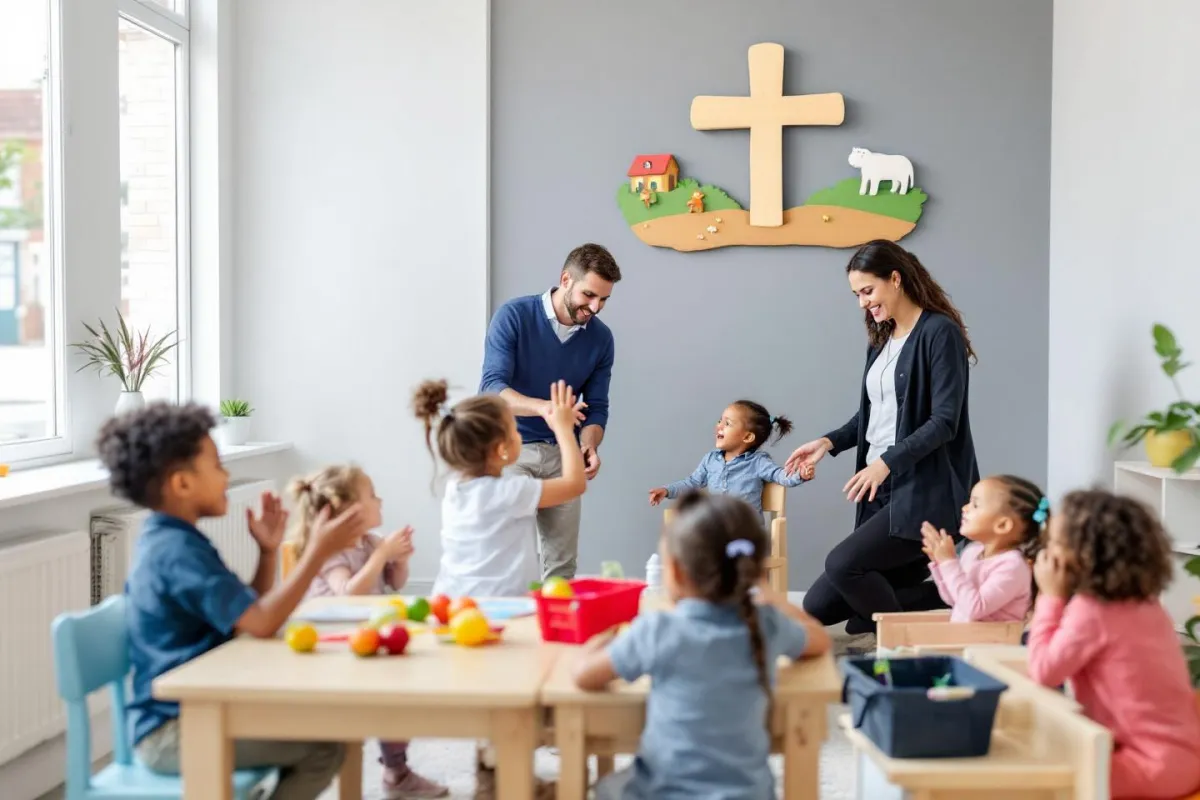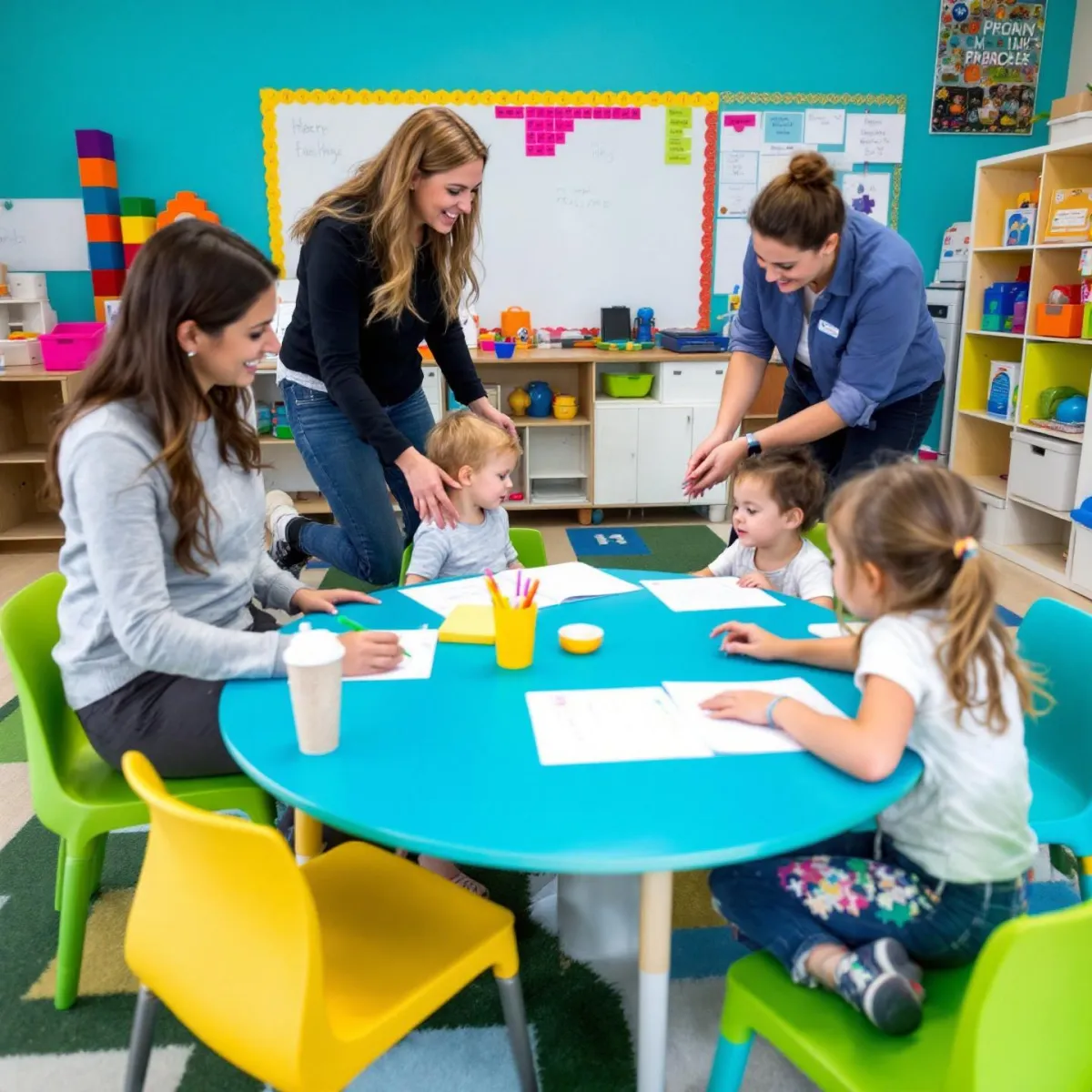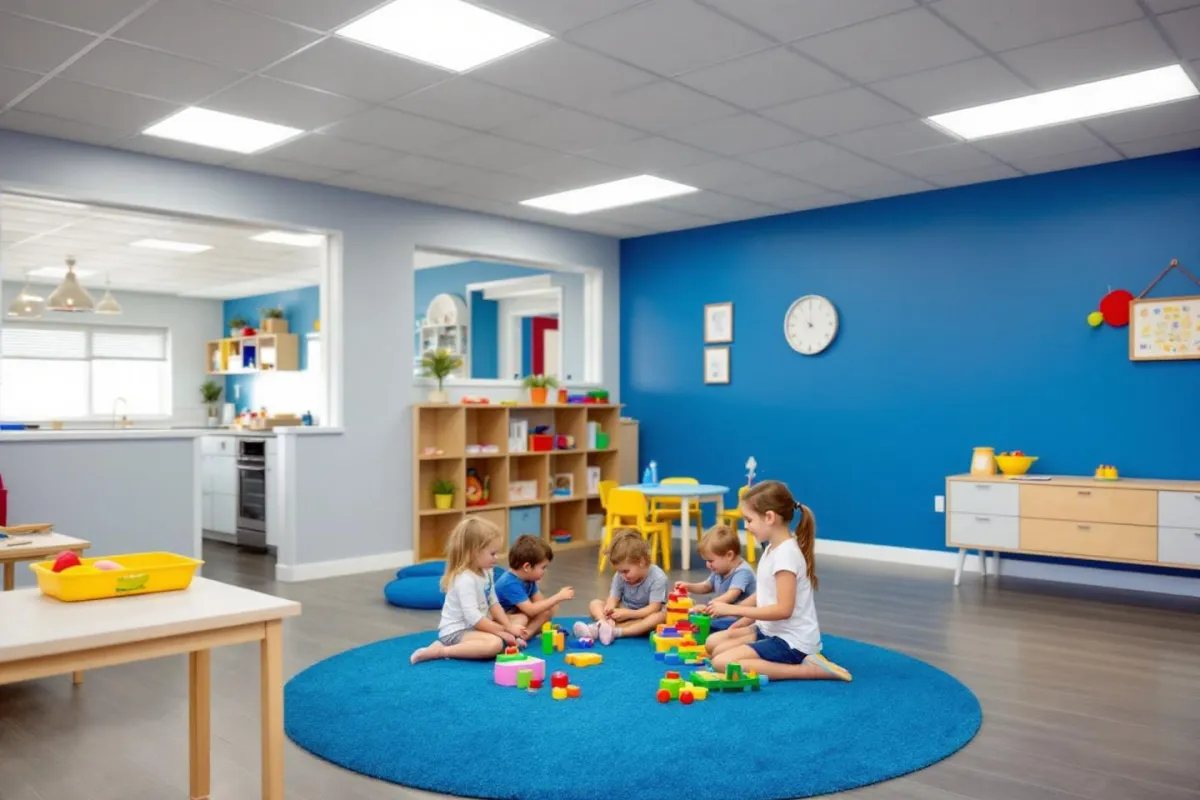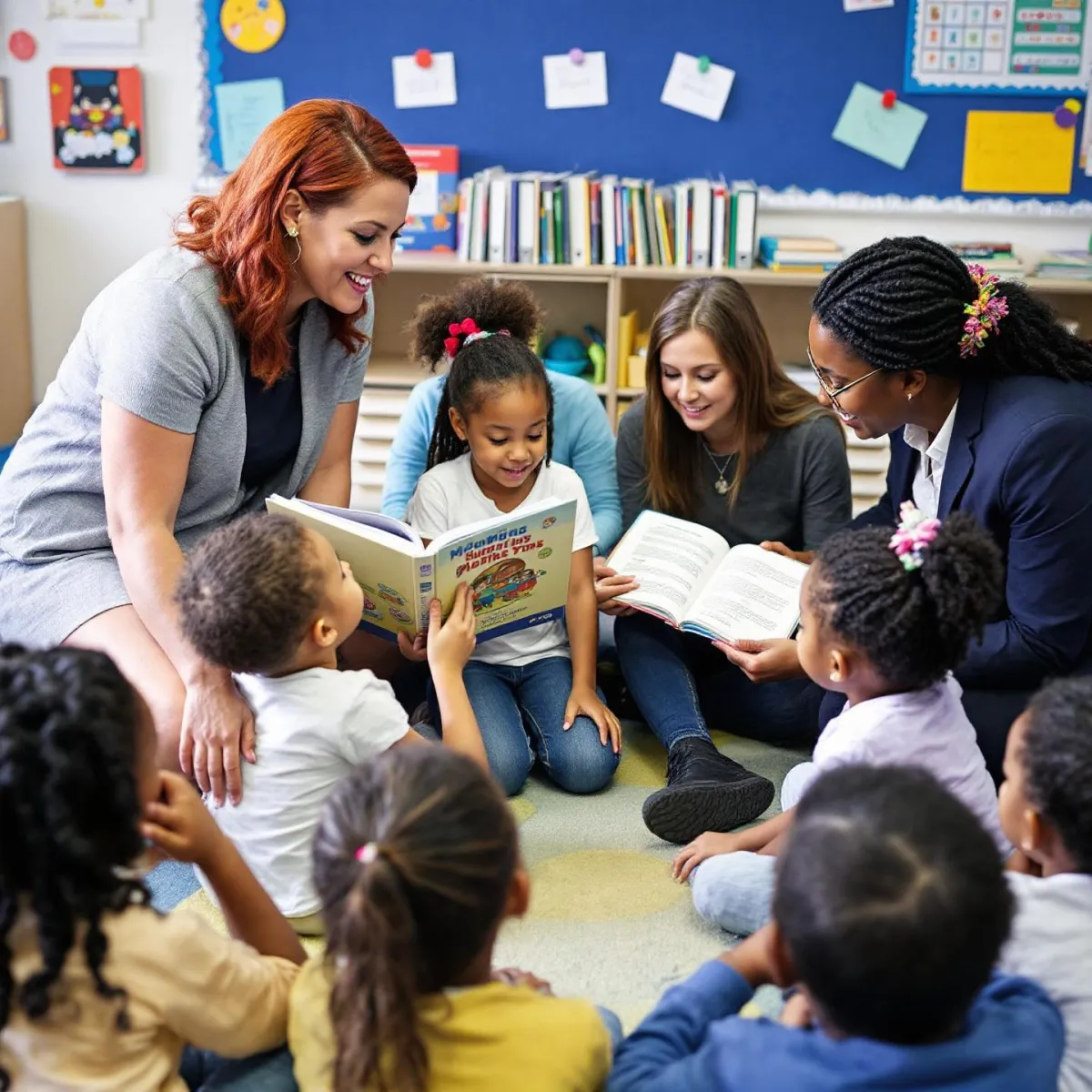Choosing the Right Childcare

Faith-Based vs. Non
Choosing a faith-based childcare center offers numerous benefits for both parents and children. Here are some key reasons:

Shared Values and Beliefs:
Alignment:
Our centers share similar values and beliefs with families who choose them. This provides a sense of comfort and reassurance knowing that your child is being cared for in an environment that aligns with your family's faith.
Moral and Ethical Guidance:
We emphasize moral and ethical principles, helping children develop a strong foundation of values.
Spiritual Development:
Exposure to Faith:
Children have the opportunity to learn about faith, spirituality, and religious teachings in a supportive and age-appropriate manner.
Positive Role Models:
Caregivers and teachers share the same faith and serve as positive role models, demonstrating how to live a faith-filled life.
Community and Support:
Shared Experiences: Parents and children connect with others who share similar beliefs, fostering a sense of community and belonging.
Support Network: We have a strong support network of families, volunteers, and staff who can offer guidance and assistance.
Quality Care and Education:
Our Comprehensive Curriculum: High-quality, faith-based, educational, written in-house, and accredited by the state. It incorporates faith-based principles while addressing children's developmental needs.
Peace of Mind:
Trust and Confidence: Knowing that your child is being cared for by people who share your values provides peace of mind and a sense of trust.
Consistent Reinforcement: Our environment reinforces the values and beliefs that you are teaching your child at home.
Opting for a faith-based childcare center uniquely blends spiritual and educational growth, embedding values and beliefs into daily care. This provides a consistent moral foundation and a nurturing environment aligned with your family's faith.

Center vs. In-Home
When selecting childcare, parents often weigh the benefits of a licensed center against an in-home daycare. Understanding the fundamental differences is key to determining which environment will best support your child's development and meet your family's needs.

Structured Curriculum
Childcare centers often have a more structured curriculum and age appropriate activities designed to promote learning and development. This can be beneficial for children who thrive in a routine and structured environment.
More Children
Centers typically have more children, providing opportunities for socialization and interaction with peers. This can help children develop important social skills like sharing, cooperation, and conflict resolution.
Trained Staff
Childcare centers usually employ caregivers with specialized training and experience in early childhood education. This can ensure that your child receives high-quality care and guidance.
Safety
Centers often have stricter safety protocols and emergency procedures in place, providing peace of mind for parents.
Variety of Activities
Centers can provide a variety of age-appropriate activities, including art, music, and physical education, to stimulate your child's development.
Standards
Childcare centers are typically subject to more stringent licensing and regulatory requirements, ensuring that they meet certain standards of care.
Options
Many centers offer flexible scheduling options which can be helpful for working parents.
While in-home daycare can sometimes offer a more intimate and personalized setting, childcare centers often provide a wider range of benefits, especially for parents who prioritize structured learning, socialization, and experienced care. Ultimately, the best choice for you and
your child will depend on your individual needs and preferences.

Cost vs. Care
Most of the parents we talk to say that while cost is a concern, they also consider the quality of care they are receiving versus the cost, which helps them determine the value that center provides. Higher cost is usually associated with:

Better Curriculum:
High-quality childcare centers often implement well-researched and thoughtfully designed curricula that go beyond basic supervision. These programs are intentionally structured to promote holistic development, incorporating age-appropriate learning objectives in areas like literacy, numeracy, science, art, and social-emotional skills. This structured approach ensures children are consistently exposed to stimulating content and activities that foster their cognitive growth and prepare them for future learning.
More Activities:
Childcare settings typically offer a wider range of activities compared to what might be readily available at home. These can include organized group games, arts and crafts projects, music and movement sessions, storytelling, and opportunities for dramatic play. This variety not only keeps children engaged and entertained but also exposes them to different ways of learning and exploring their interests, fostering creativity and problem-solving skills.
Personalized Care:
While in a group setting, quality childcare often strives to provide personalized attention to each child. Experienced caregivers are skilled at observing individual needs, learning styles, and developmental paces. They can adapt activities and interactions to support each child's unique strengths and challenges, ensuring that every child feels seen, valued, and encouraged to thrive at their own pace.
Nurturing Environment:
Childcare centers prioritize creating a warm, safe, and supportive atmosphere where children feel secure and comfortable. Caregivers are trained to be responsive to children's emotional needs, offering comfort, encouragement, and positive reinforcement. This nurturing environment fosters a sense of belonging and helps children develop trust and emotional resilience.
Better Facilities:
Purpose-built childcare facilities are often designed with young children's needs in mind. This can include age-appropriate furniture, dedicated learning areas, safety features, and resources specifically chosen to support various developmental domains. These thoughtfully designed spaces contribute to a more stimulating and functional environment for learning and play.
Modern Facilities:
Contemporary childcare centers often incorporate modern amenities and resources that enhance the learning experience. This might include access to technology for age-appropriate educational games, updated learning materials, and innovative equipment that supports interactive and engaging activities. These modern facilities reflect a commitment to providing children with the best possible resources for their development.
Experienced Staff:
Childcare centers typically employ trained and experienced professionals who possess expertise in early childhood development. These caregivers understand child psychology, age-appropriate activities, and effective strategies for guiding children's learning and behavior. Their experience ensures a higher level of care, safety, and educational support for your child.
Ample Outdoor Space:
Many childcare facilities offer dedicated and well-equipped outdoor play areas. These spaces provide crucial opportunities for children to engage in physical activity, explore nature, and develop gross motor skills. Outdoor play also fosters creativity, social interaction, and a connection with the natural world, contributing to overall well-being.
High-quality childcare offers significant advantages, fostering social, emotional, and cognitive growth through enriching activities, personalized attention, and experienced staff in stimulating environments. These benefits provide a strong foundation for a child's future success and well-being, making childcare a valuable option for many families.

Childcare vs. Stay at Home
While staying at home offers comfort and familiarity, high-quality childcare provides a wealth of enriching experiences that contribute significantly to a child's development. Consider these key benefits:

Social and Emotional Development Blossoms:
Childcare fosters crucial social skills through constant interaction with peers. Children learn to share, cooperate, negotiate, and resolve conflicts in a supportive environment. This early exposure to social dynamics builds confidence and lays the foundation for healthy relationships later in life. They also develop empathy and learn to understand different perspectives.
Cognitive Skills Get a Head Start:
A well-structured childcare program offers stimulating activities designed to spark curiosity and promote cognitive growth. From storytelling and music to early literacy and math concepts, these experiences broaden a child's understanding of the world and prepare them for future academic success. The diverse learning environment often introduces children to new ideas and ways of thinking.
Language and Communication Skills Expand:
Being surrounded by other children and engaging with caregivers encourages language development. Children constantly hear new words, participate in conversations, and learn to express themselves effectively. This rich linguistic environment can significantly boost their vocabulary and communication abilities.
Independence and Self-Reliance Take Root:
Childcare provides opportunities for children to develop independence as they navigate a structured environment away from their primary caregivers. They learn to follow routines, manage their belongings, and make simple choices, fostering a sense of self-reliance and responsibility.
Language and Communication Skills Expand:
Being surrounded by other children and engaging with caregivers encourages language development. Children constantly hear new words, participate in conversations, and learn to express themselves effectively. This rich linguistic environment can significantly boost their vocabulary and communication abilities.
Independence and Self-Reliance Take Root:
Childcare provides opportunities for children to develop independence as they navigate a structured environment away from their primary caregivers. They learn to follow routines, manage their belongings, and make simple choices, fostering a sense of self-reliance and responsibility.
Preparation for School Becomes Seamless:
Childcare introduces children to a classroom-like setting, helping them adapt to schedules, group activities, and following instructions. This early exposure can make the transition to preschool and kindergarten much smoother and less daunting for both the child and the parents.
Support and Resources for Parents:
Childcare isn't just beneficial for children; it also provides valuable support for parents. Knowing your child is in a safe, nurturing, and stimulating environment allows you to focus on work or other responsibilities with greater peace of mind. Many childcare centers also offer resources and connect parents with valuable information on child development.
Both staying at home and attending childcare have their own merits. However, for many families, the social, emotional, and cognitive advantages offered by a high-quality childcare program provide a strong foundation for a child's future success and well-being.

The FFCC Difference
For families seeking a childcare environment that nurtures not only their child's cognitive and social development but also their spiritual growth, Faith Filled Child Care stands out as the optimal choice.

FFCC Story, Mission, and Culture
It started with a vision and a dream!
Learn More!
FFCC Curriculum
Faith-Based, developmentally appropriate, and fun!
Learn More!
FFCC Teachers, Guest Educators, Classrooms, and Play Spaces
See why devotion, faith, learning, and fun make all the difference!
Learn More!
FFCC Food Program
Nutritionally-focused, appropriately-portioned, and flavorful!
Learn More!
FFCC Infant, Toddler, and Preschool Programs
Developmentally-appropriate, faith-filled, educational, and fun!
Learn More! Infant
Learn More! Toddler
Learn More! Preschool
By intentionally weaving faith-based principles into every aspect of care, we provide a unique and holistic foundation for your child's formative years. Below, you'll discover the specific ways Faith Filled Child Care excels in nurturing your child's heart, mind, and spirit.

Fun, Educational,
Faith-Based, and Affordable Childcare
Quick Links
Home
About Us
Services
Useful Links
Testimonials
FAQ's
Blog

Fun, Educational,
Faith-Based, and Affordable Childcare
Quick Links
Home
About Us
Services
Useful Links
Testimonials
FAQ's
Blog